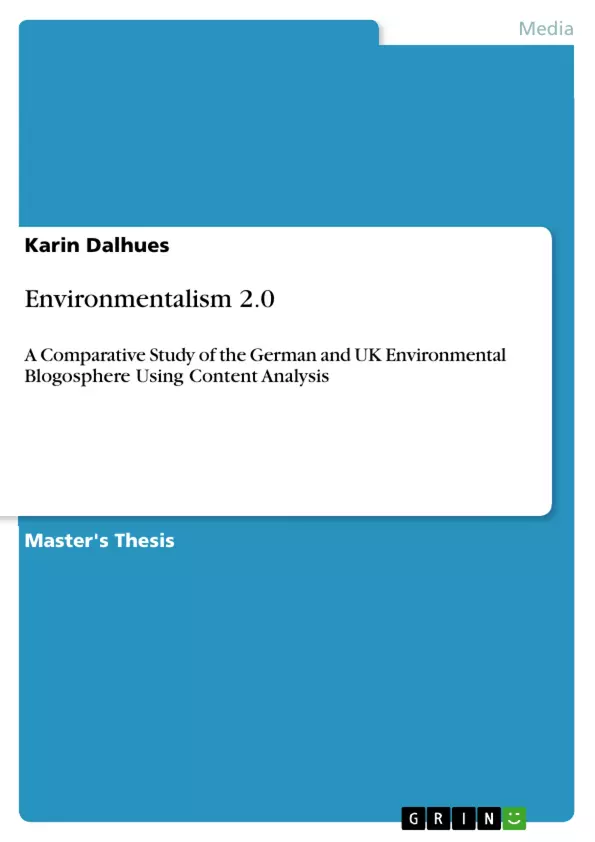The environmental blogosphere – the entirety of blogs with a thematic focus on environmental issues – is the modern environmentalists’ platform to inform and mobilise audiences. Against the backdrop of an increased presence of environmental issues in current public debates, this dissertation compares the German and the UK environmental blogospheres in order to advance an understanding of their distinctive structures and contents. This research aim was met through a comprehensive review of literature, as well as through primary research on a total of 800 blog entries from German and UK environmental blogs. The research method of choice was content analysis, but also an adapted version of grounded theory was applied to one element of research. The key findings this study produced include that the dominant thematic foci strongly differ between the two countries and that UK bloggers express their opinions more strongly than German ones. Paradoxically, the German environmental movement appeared to be stronger than the UK one in general, but the UK environmental blogosphere in turn seemed to be more capable in using blogs as a platform for lobbying. Concerning structural blog features, which include for example entry length and number of comments, the study found that the differences between the two countries are rather small, but that there are significant discrepancies with earlier structural blog research, pointing towards a rapid development of blogs over the past years. The study concludes that, although the UK environmental blogosphere is more developed than the German one, there is a lot of potential for both countries’ environmental movements to increase their power through blogging if they manage to blog more professionally and capture a larger readership.
Inhaltsverzeichnis (Table of Contents)
- INTRODUCTION
- RESEARCH FOCUS
- STRUCTURE OF THE DISSERTATION
- LITERATURE REVIEW
- INTRODUCTION
- BLOGS AND THE BLOGOSPHERE
- ENVIRONMENTALISM
- METHODOLOGICAL MODELS
- RESEARCH AIM AND OBJECTIVES
- METHODOLOGY
- RESEARCH STRATEGY
- ENSURING THE QUALITY OF THE WORK
- ETHICAL ASPECTS
- FINDINGS OF THE PRIMARY RESEARCH
- BLOG CATEGORIES
- LENGTH OF ENTRIES
- READER COMMENTS
- LINKS TO EXTERNAL SOURCES
- NUMBER OF AUTHORS
- PURPOSE OF THE BLOG
- BLOGS AND OPINION
- RELATIVE SIGNIFICANCE OF THE ENVIRONMENTAL BLOGOSPHERE
- SUMMARY OF FINDINGS
- CONCLUSION
- DISCUSSION AND SYNTHESIS OF THE FINDINGS
- ANALYSIS OF BLOG STRUCTURES
- MISCELLANEOUS FACTORS
- CONCLUSIONS
- RESEARCH OBJECTIVES: SUMMARY OF FINDINGS AND CONCLUSIONS
- RECOMMENDATIONS FOR FURTHER RESEARCH
- CONTRIBUTION TO KNOWLEDGE
- LIMITATIONS OF THE STUDY
- REFLECTIONS ON THE RESEARCH PROCESS
Zielsetzung und Themenschwerpunkte (Objectives and Key Themes)
This dissertation explores the German and UK environmental blogospheres, comparing their structures and content. It aims to understand the unique characteristics and influence of these online platforms within the broader environmental movement. * **Comparative Analysis of Blogospheres**: The study investigates the differences in thematic focus, blog structures, and communication styles between German and UK environmental blogs. * **Role of Blogs in Environmentalism**: The research examines how environmental bloggers utilize their platforms for information sharing, advocacy, and mobilization. * **National Differences in Environmental Communication**: The study explores how cultural and societal contexts influence the content and structure of environmental blogs in different countries. * **Impact of the Blogosphere on Environmentalism**: The dissertation analyzes the potential influence of the blogosphere on shaping public opinion, influencing policy decisions, and driving environmental activism. * **Evolution of the Environmental Blogosphere**: The research examines the development and growth of the environmental blogosphere, comparing findings to previous studies and assessing its continued relevance.Zusammenfassung der Kapitel (Chapter Summaries)
- Introduction: This chapter outlines the dissertation's research focus, its structure, and the significance of the environmental blogosphere in contemporary environmentalism.
- Literature Review: This chapter provides an overview of existing research on blogs, environmentalism, and relevant methodological models. It also clarifies the research objectives and aims of the dissertation.
- Methodology: This chapter details the research strategy employed, including the selection of blogs and data collection methods. It also discusses the quality assurance measures implemented and the ethical considerations of the research.
- Findings of the Primary Research: This chapter presents the findings of the content analysis conducted on 800 blog entries from German and UK environmental blogs. It examines various structural and content-related aspects of these blogs, including categories, entry length, reader comments, links, author numbers, blog purpose, and opinion expression.
- Discussion and Synthesis of the Findings: This chapter analyzes the findings of the primary research, comparing the blog structures of the two countries and discussing various factors that influence the blogosphere's development.
Schlüsselwörter (Keywords)
The primary keywords and focus topics of this dissertation include environmental blogosphere, environmentalism, content analysis, comparative research, German environmental movement, UK environmental movement, blog structure, blog content, public opinion, policy influence, environmental activism, and online communication.Frequently Asked Questions
What is the "environmental blogosphere"?
It refers to the entirety of blogs focused on environmental issues, used by modern environmentalists to inform, mobilize, and lobby audiences.
How do German and UK environmental blogs differ?
UK bloggers tend to express opinions more strongly and use blogs more for lobbying, while thematic foci differ significantly between the two countries.
What role do blogs play in environmental activism?
Blogs serve as platforms for sharing information, shaping public opinion, and driving activism beyond traditional media channels.
What were the key findings regarding blog structure?
Structural differences (like entry length and comments) between Germany and the UK are small, but there is a rapid overall development compared to earlier research.
Is the environmental movement stronger in Germany or the UK?
The study notes a paradox: the German movement appears stronger in general, but the UK blogosphere is more developed in its use as a lobbying platform.
- Quote paper
- Karin Dalhues (Author), 2011, Environmentalism 2.0, Munich, GRIN Verlag, https://www.grin.com/document/213623



